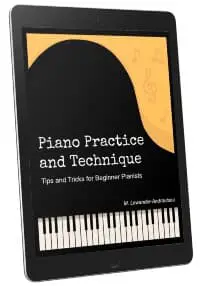- Home
- Basic Piano Theory
- Music Theory Q&A
- About Composing: How to Compose a Song
About Composing: How to Compose a Song
by Dan
Hi,
I found your composing lessons really helpful. It was pretty much what I was looking for. Thanks for posting them.
I have a question that might sound stupid for you but it has been bouncing inside my head for a while. So how do I turn this about 10 second’s melody into an average duration song (3-4 min)?
I mean without keep repeating same notes and chords to get boring or keep adding new notes? Do I make any sense?
Anyway, it would be cool if u could post some tips and tricks on arranging a full song like adding a bridge and stuff, what to do and what not to do and so on.
Thanks again!
Answer:
Hello!
You have a very good question here! Composing a song can be as easy or as hard as you wish. Some of the magic lies in the construction itself.
As you already know most songs have a verse, a chorus (or refrain) and a bridge or two. Often a song also has some kind of intro, and sometimes an "outtro" or coda (ending).
A very common (and simple) combination for a song hit is:
Verse/Chorus/Verse/Chorus/Bridge/Chorus
When you start writing songs, the best advice I can give is to learn from the masters. Listen and analyze your favorite songs, (but start with the simplest). Pick them apart and see how they are built. Check your feelings for each part; what makes you like it, or not.
Many times a really great song is actually made very simple. Let’s look at Beatles' "Norwegian Wood" for example. It is a great song, and yet so simple. Hum along to see how it’s made:
Intro
The piece starts with the same melody as the verse played first by a guitar, then a sitar.
Verse
The melody in the verse is three short melodic phrases:
- "I once had a girl (first part of verse; 5 notes (actually like «London Bridge is falling down»)
- or should I say(similar melodic outline a bit lower, with an interval of a 3rd between first and second note)
- She once had me."(similar melodic outline again, lower with an interval of a 5th between first and second note).
This was the verse. Then the verse is repeated with the same melody once more.
Chorus
The chorus has an even simpler melody; one longer phrase made of a series of skips and repeated notes:
"She asked me to stay and she told me to sit anywhere"
That’s all the melodic material there is! The chorus is then repeated with the same melody once more.
Bridge
As a bridge there is actually only one (Dominant) 7th chord, leading back to the verse again.
Such a great song. And so simple! The formula for Norwegian wood is then;
Intro/Verse/Chorus/Bridge (1 single chord!)/Verse /Break (sitar playing verse)/Chorus/Bridge/Verse/Coda (melody from verse with Sitar).
But, ultimately the whole song is composed only of two short melodies: one for the verse and the other for the chorus!
Now you try!
Using the formula above you could either compose one more short melody, or divide the one you have in two shorter melodies. Decide which is the verse or chorus and then combine in one of the patterns mentioned above.
Composing a bridge can be as elaborate or simple as you like; from one single chord as in Norwegian wood, to a long improvised solo.
My suggestion is to stay simple. The main job of a bridge is to lead back to the verse again. You can do this by simply starting on the note where the chorus finished, and then step up (or down) to the first note of the verse.
An intro could be a part of the verse or chorus, or as in «Norwegian wood», the verse just played on another instrument. It could also be something entirely different, but keep it super simple as you begin composing!
A coda or ending could be as simple as a fade out of a repeated part of the song. Or just stop.
One last tip is to warm up by composing a «scrap» song. Just analyze a song you like, and with your own melodies for the different parts, combine them in the same manner. This is a really fun exercise! You could even borrow the chords, but make your own melodies.
Have fun, and let me know how it goes!
Comments for About Composing: How to Compose a Song
|
||
|
||
